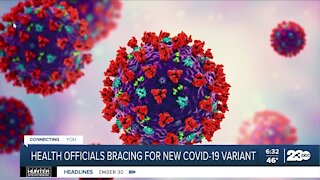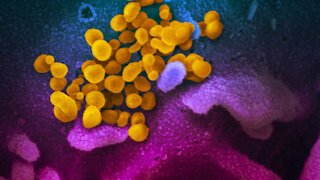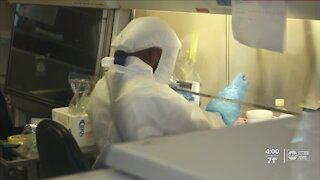Premium Only Content

Omicron What we know about the new COVID variant
Omicron: What we know about the new COVID variant
Evidence suggests the new variant may be more transmissible than Delta, but there are still many unknowns at play.
A new SARS-CoV-2 variant that was first identified by scientists in South Africa on November 24, has been labelled a “variant of concern” (VOC) by the World Health Organization (WHO). Cases have been detected in a growing list of countries, including Belgium, Hong Kong, Israel, the United Kingdom, Germany and Australia.
Evidence suggests that the new Omicron (or B.1.1.529) variant may be more transmissible than the already highly transmissible Delta variant, with the European Centre for Disease Prevention and Control referencing the variant’s “immune escape potential and potentially increased transmissibility advantage compared to Delta”.
Variants of the SARS-CoV-2 virus are not unusual.
The more the virus spreads, the more likely it is to mutate.
Mutations arise as the virus multiplies after it infects a human host.
Once inside of a person, a virus’s job is to instruct its human host’s cells to make copies of the virus that go on to infect more cells and eventually other people.
As the virus rapidly multiplies its genetic material, random errors in its DNA can occur during the copying process; these are known as mutations.
Most mutations are non-viable for the virus, meaning it can actually do the virus harm; some are viable but not advantageous to the virus; but every now and again mutations that give the new virus – now known as a variant – the edge over existing variants can occur.
Mutations are far more likely to occur in people with weakened immune systems – as they are likely to take more time to clear the virus, giving it more time to multiply and mutate – and in unvaccinated people, as their immune systems are not primed by vaccines to destroy the virus quickly before it has a chance to mutate.
South Africa has a relatively low vaccination rate, with only approximately 35 percent of the population fully vaccinated, and Botswana, where it is thought to have originated, has an even lower vaccination rate – due in large measure to global vaccine inequality.
If Omicron did originate in Southern Africa, then this may be part of the reason why.
The Omicron variant is characterised by 30 mutations, three small deletions and one small insertion in the spike protein – the spikes which are on the outside of the virus and help it to enter the cells; of these, 15 are in the receptor-binding domain – the part of the spikes which allow them to bind to a host receptor.
The most widely used vaccines – Pfizer, Moderna and Oxford AstraZeneca – are based only on getting our immune systems to recognise the spike protein part of the SARS-CoV-2 virus as foreign, and building up an army of immune cells directed at this part of the virus. But if the mutations in Omicron change the spike protein enough that our immune systems can no longer fully recognise it, then it may mean there is a degree of immune escape for this variant. It may also mean that those relying on natural immunity, immunity from a previous COVID-19 infection – not something I recommend – may have cause to worry. There is some concern that the mutations that Omicron harbours may leave people who have been previously infected open to reinfection. According to the WHO, preliminary evidence suggested an increased risk of reinfection with this variant, as compared with other VOCs. However, it is far too early to know any of this for sure. Further virology studies are needed to understand the vaccines’ effectiveness against the new variant and its effect on reinfections. The WHO has said multiple studies are under way as advisers continue to monitor the variant. It is possible Omicron will have some escape from existing immunity given by vaccines and previous infections, but the chances of it rendering previous protection useless is extremely low and it is far more likely the vaccines will continue to offer a good degree of protection even from this variant. Moderna’s Chief Executive, Stephane Bancel has gone on the record, talking to news outlets saying he does not think the COVID-19 vaccines are going to be as effective against the Omicron variant, though he did say he wasn’t sure how much of a difference there would be. Recent surges in new infections in South Africa have raised serious concerns about increased transmissibility of the new variant, particularly in younger people. We saw how the Delta variant that was first identified in India caused a widespread rise in cases across Europe and the US, where it surpassed the Alpha variant due to its ability to bind to human host cells quicker and with more affinity. Scientists who were trying to explain the sudden surge in cases in South Africa were the first to discover the new variant. The rapid increase in cases in South Africa associated with Omicron, suggests the variant is able to outcompete Delta, a variant that is already highly transmissible. The rise of new variants highlights the responsibility wealthy countries have in vaccinating the rest of the world as well as their own populations … Nobody is safe until everybody is safe. According to the WHO, Omicron has been detected at faster rates than previous surges in infection, suggesting this variant may have a growth advantage. The SARS-CoV-2 virus which causes COVID-19 uses its spike protein to bind to and infect human host cells; if the mutations on the spike protein allow for quicker and stronger binding affinity than Delta, then Omicron could soon become the dominant variant wherever it is present. Once again, it is too early to know for sure and the evaluation process is ongoing, but these early signs are worrying. There is currently no data to suggest that those who are infected with the Omicron variant suffer any different symptoms from those who were infected with previous variants. No unusual symptoms have been reported from studies in South Africa and indeed like previous variants some people who are infected with Omicron have been asymptomatic. There are many unknowns at play right now, but scientists are working at record speed to get a better understanding of the Omicron variant and what it might mean for the pandemic. South Africa is owed a debt of gratitude for identifying the variant and bringing it to the attention of the world, knowing the implications this would likely have for the country and others affected by this variant. The scientists and health authorities were quick to share the information about Omicron with the rest of the world, and although it meant borders and travel were shut to them, something the South African authorities were highly critical of, it also meant other scientists could get to work uncovering the much-needed information about Omicron. It is wise for countries that have not yet seen the variant to act quickly by putting in travel restrictions and by carefully genome sequencing high-risk individuals; we are lucky in that the Omicron variant is detectable through PCR testing. The rise of new variants highlights the responsibility wealthy countries have in vaccinating the rest of the world, as well as their own populations. The statement made famous by the director-general of the WHO, Dr Tedros Adhanom Ghebreyesus, has never rung more true: Nobody is safe until everybody is safe.
-
 3:25
3:25
WTMJMilwaukee
3 years agoWhat we know so far about the omicron variant
2714 -
 5:31
5:31
KSHB
3 years agoSeeing the science: What we know about the omicron variant
3804 -
 2:31
2:31
WTMJMilwaukee
3 years agoWhat Milwaukee health officials know about the Omicron variant
3081 -
 2:03
2:03
KERO
3 years agoU.S. preparing for Omicron COVID variant
1.89K5 -
 6:29
6:29
Newsy
3 years agoWhat Do We Know About The Omicron Variant So Far?
4.06K47 -
 2:29
2:29
KERO
3 years agoScientists race to learn more about COVID variant Omicron
48 -
 2:05
2:05
WFTS
3 years agoOmicron variant: What you need to know
1.62K9 -
 4:03
4:03
WMAR
3 years agoWhat you need to know about the new COVID-19 variant
316 -
 1:02
1:02
Reuters
3 years agoSouth Africans concerned about new COVID variant
4004 -
 2:11:11
2:11:11
TheSaltyCracker
9 hours agoTrump Fires Everyone ReeEEeE Stream 01-31-25
204K314